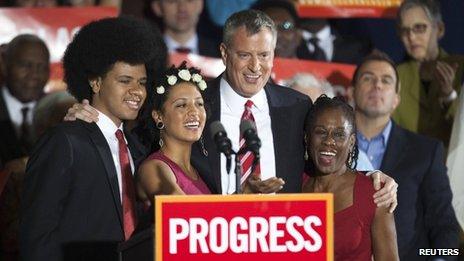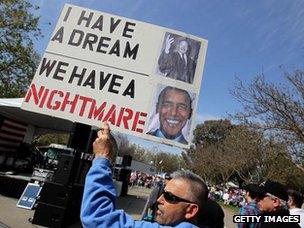Mardell: Is old-school racism dying?
- Published

New York City Mayor-elect Bill de Blasio has made frequent appearances with his wife Chirlane and children Dante and Chiara
A veteran Washington Post columnist's comments, external on a marriage between a white man and a black woman have provoked fury. It tells us more than you might think about the state of politics in this country.
What Richard Cohen wrote was this: "People with conventional views must repress a gag reflex when considering the mayor-elect of New York - a white man married to a black woman and with two biracial children."
Straight out of the" barmy old racist" draw you might think, and hardly worthy of further comment.
But the curve ball is not just that Cohen vehemently rejects, external the charge of racism. It is that he sees himself as a liberal.
His column was trying to make the point that a core of Republican supporters are irreconcilable, viscerally unable to accept the way America has changed.
'American politics 101'
As far as I am concerned this point is about the third paragraph of any lecture on "American politics 101"*.
On one level Cohen's folly is merely being over-polite to his target. Had he said the people doing the gagging were out-of-touch racists, there wouldn't have been an outcry.
But he calls them "people with conventional views" who object to "the mainstreaming of what used to be the avant-garde".
This last sentence is rather sophisticated, and captures well the way general views have evolved from regarding something as "unacceptable" to "exotic" to "normal".
But it is that "conventional views" phrase that at least implies a pretty close empathy for a view which he says is not racist, but clearly is.
He is right that these views are complex, onion-skinned layers of revulsion to a cluster of disparate changes.
Race is of course a charged topic in a country built on immigration, made up of different races. Each new wave of immigrants has tended to try to pull the drawbridge up on the last lot.
The history of white power and black oppression is central to the US, but it is not the only racial conflict present. But it is the one where there has been the most dramatic change.
'Tea Party ethos'

Tea Party supporters are more outwardly concerned with fiscal issues than social matters
There are many Tea Party-type conservatives who are not racists and who object to their country changing both economically and culturally in ways that have little to do with race.
Opposition to big government and high taxation is more central to the Tea Party ethos than social conservatism. Social conservatives can oppose abortion and gay marriage without worrying about race.
Then there are those who don't see themselves as racists - "colour does matter to me" - but require that all newcomers, and those whose ancestors were dragged to this land of opportunity against their forefathers' will, join an Anglo-Saxon club with Anglo-Saxon rules, and speak English, and speak it properly.
Then they will graciously, politely (Cohen alert - irony being deployed) not mention skin colour, as long as nobody else does.
But there are also people who don't see themselves as racist yet object to the upturning of what they see as a natural order - the woman who says, "There's something about Obama I don't like, I just can't put my finger on it".
Cohen may not think people who object to "biracial" children - in itself a quaint term out of history's dustbin - are racist. But they are.
To them there is something unnatural about it. Just as there is something odd about having someone like Mr Obama in the White House. They just can't put their finger on it.
Now for another "-ism" and another problem for Republicans. This one is "ageism". Cohen is 72.
The civil rights movement was at its high when he was in his teens. I don't know whether he was inspired by it or shocked by it but there was a huge upheaval in American society when he was forming his views.
'Views are changing'
Those "conventional views" were indeed conventional. When I see pictures of people spitting on little black children going to school, I can't help thinking that the children of the venomous spitters must be around my age now.
I am sure some of them will have ditched their parents' views - but surely some of them surely have not changed. But what was once conventional now isn't - the Washington Post's own WonkBlog points out, external 87% of Americans approve of interracial marriage.
Many who don't are older. I know people of my parent's generation who freely express such views, without realising they are offensive.
My 11-year-old doesn't get it. When we watch a film about civil rights, he isn't outraged, he's puzzled.
He requires explanation of an alien phenomenon that makes no sense - to him thinking of people as different because of their skin colour is as silly as not allowing women to ride bicycles.
I'm certainly not arguing that the pernicious effects of racism are dead in the real world. That is very far from the truth. But views are changing.
To put it bluntly, seeing racism as a "conventional view" is literally dying out. Cohen's main point - and it is still a good one - that Chris Christie is unacceptable to a certain powerful element among the Republican Party faithful is still true.
The big question is whether that will change over time or not.
The visceral revulsion of some conservatives to the way their country is morphing into something new is at the heart of American politics - but it might be that over time, race will become a less and less acceptable part of that conglomeration of distaste.
*101 - American term for a basic course in anything. Nothing to do with George Orwell's room or Joe Strummer's first band. Out of time, out of place
- Published14 November 2013

- Published14 November 2013

- Published12 November 2013
